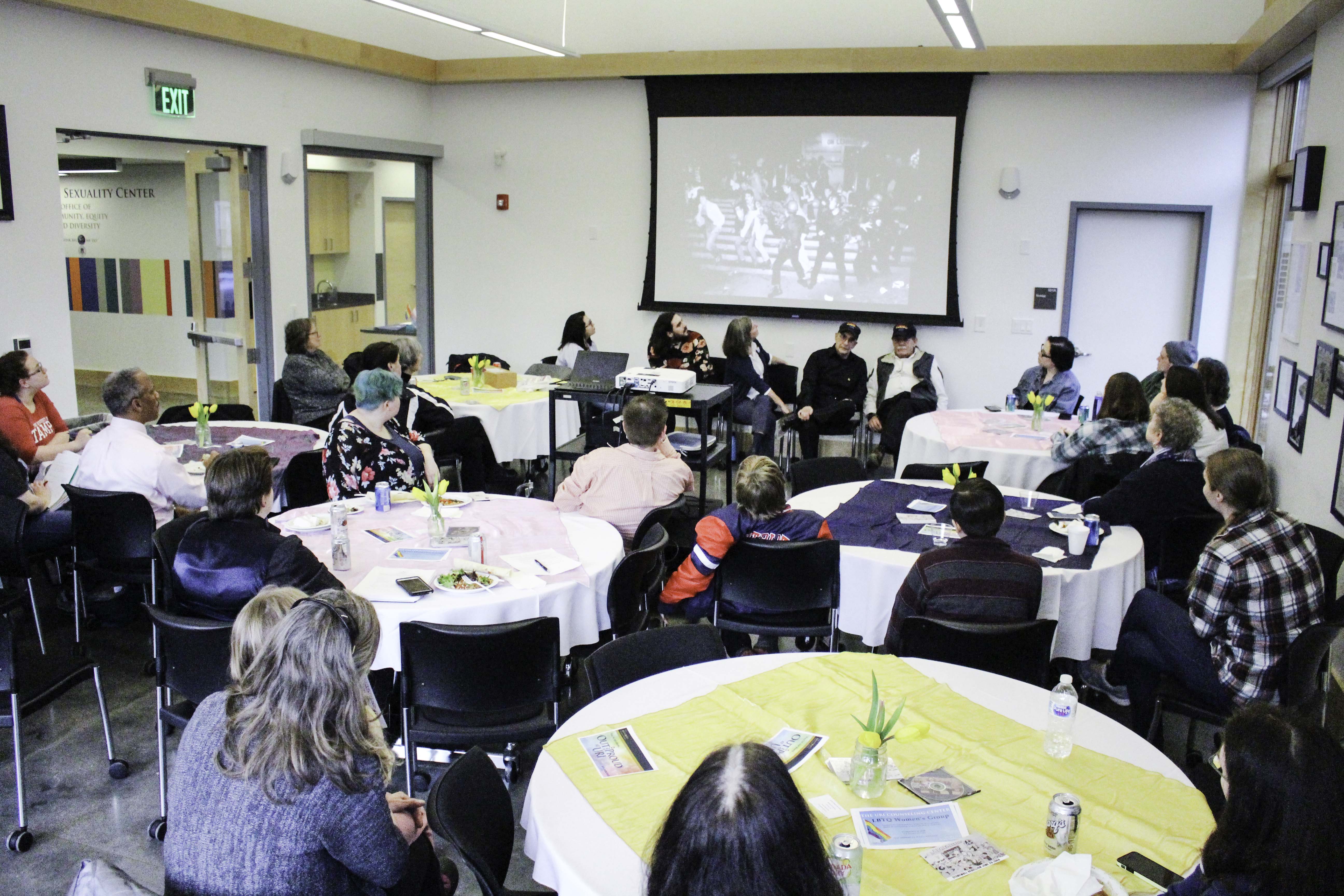The community gathered this past week to remember the Stonewall Riots during the LGBTQ+ Symposium. |Photo by James McIntosh
Fifty years after the Stonewall riots, an intergenerational panel at the Gender and Sexuality Center reflected on the event that now acts as a catalyst for the LGBTQ+ rights movement last Thursday night.
The panel was the keynote event for the University of Rhode Island’s 24th annual LGBTQ+ symposium. The panel featured David Velasco Bermudez, who participated in the Stonewall riots. Bermudez was joined by his husband Bob Isadore, URI alumna and Counseling Center staff member Holly Nichols, junior political science and gender & women’s studies major Hope Souza and senior English and writing & rhetoric major Nate Vaccaro.
The multigenerational panel discussed the importance of Stonewall in LGBTQ+ history, their own histories with activism and the future of LGBTQ+ activism and rights.
The 1969 Stonewall Riots were a series of protests by the LGBTQ+ community in response to a violent police raid of the Stonewall Inn, a popular gay bar in New York City. Very few establishments welcomed LGBTQ+ people at this time, so places such as Stonewall were some of the only locations in which openly gay, lesbian, bisexual and transgender individuals could feel accepted.
Bermudez, one of the six remaining survivors of the Stonewall riots, participated in the riots due to the injustice he and his friends faced. Bermudez explained that he was beaten and assaulted for being a gay man. He said that the riots were what sparked an insurgency against homophobia and transphobia at that time.
“All of a sudden we woke up and we started fighting,” Bermudez said. “All of us. It wasn’t that we were doing this because we were a bunch of crazy kids, because we were, you know, it was just that we were tired.”
Bermudez also stressed how the Stonewall riots were a turning point in LGBTQ+ rights, especially since before these events very few people could live out of the closet.
“Always think of not only the veterans of Stonewall, but think of all the lesbians, and all of the drag queens that lived in the ’40s, and the ’30s, in the ’20s when they used to lock you up and kill you or whatever,” Bermudez said.
Nichols then spoke about her experience as an LGBTQ+ person attending URI in the 1990s. She said that she was married to a man and questioning her sexuality. She said that the lack of LGBTQ+ representation was harmful, and it was difficult to find her place.
“I really felt like I was destined to be discriminated against, harassed, that people weren’t going to accept me, that this was going to be an uphill battle wherever I went,” Nichols said.
However, Nichols found URI’s Gay, Lesbian
Today, Nichols facilitates URI’s LBTQ women’s group and served on the President’s LGBTQ+ Commission at the University.
Nichols also reflected on the 2010 LGBTQ+ student sit-in protest at URI, in which LGBTQ+ students and allies demanded more funding for LGBT issues at the University.
Next, Souza explained that reflecting on Stonewall was important because it offers perspective on how far LGBTQ+ rights have come.
“As a young person, it’s so powerful to hear people who are older than you and what they have gone through, which has allowed us to be where we are today,” Souza said. “We probably wouldn’t be sitting in this building had it not been for acts such as the Stonewall and things you have done.”
However, everyone on the panel admitted that although LGBTQ+ rights and representation have improved over the years, there is still injustice. Conversion therapy, healthcare, employment, housing discrimination
“Each one of you here has an obligation, even if it’s on little tiny thing, you need to do it,” Isodore said. “Because you can make changes.”

